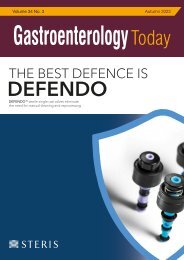Gastroenterology Today Summer 2021
Gastroenterology Today Summer 2021
Gastroenterology Today Summer 2021
You also want an ePaper? Increase the reach of your titles
YUMPU automatically turns print PDFs into web optimized ePapers that Google loves.
CASE REPORT<br />
GASTROENTEROLOGY TODAY - SUMMER <strong>2021</strong><br />
Table 1 (continued)<br />
Study author<br />
and year<br />
of publication<br />
Inflammatory<br />
disorder<br />
outcome<br />
Seizures<br />
outcome<br />
EEG CSF Other Treatment<br />
for the<br />
seizures<br />
Features of<br />
seizures<br />
TNF-alpha<br />
inhibitor<br />
onset to<br />
seizures<br />
Inflammatory<br />
disorder<br />
Patients Age at<br />
presentation,<br />
gender<br />
Haddock,2011 [11]<br />
was ceased and no seizures occurred after discharge. Now thalidomide<br />
(25 mg/d) was used to maintain remission of CD. The patient was<br />
following up for the moment.<br />
Well controlled,<br />
and no further<br />
seizures<br />
at two year<br />
follow up.<br />
Three focal<br />
seizures post<br />
discharge<br />
TNF-alpha<br />
inhibitor<br />
stopped,<br />
benzodiazepine,<br />
phenytoin<br />
Normal MRI showed<br />
abnormal<br />
high signal in<br />
the subcortical<br />
region,<br />
bilateral<br />
occipital<br />
lobes, and<br />
on the right<br />
side with<br />
extension to<br />
involve the<br />
right temporal<br />
region<br />
Right temporal<br />
lobe dysfunction<br />
Nausea, visual<br />
disturbance,<br />
unresponsive<br />
dilated reactive<br />
pupils,<br />
bradycardic<br />
and hypertensive.<br />
13 days after<br />
the first<br />
infliximab<br />
infusion<br />
4 8, female Crohn’s<br />
disease<br />
TNF, tumor necrosis factor; EEG, electroencephalogram; CSF, cerebrospinal fluid; MRI: magnetic resonance imaging<br />
Discussion and conclusions<br />
Infliximab is a chimeric monoclonal antibody against the soluble and<br />
the membrane tumour necrosis factor (TNF)-α [4]. It is effective in<br />
inducing and maintaining remission in patients with moderate-to-severe<br />
CD refractory to conventional therapy [5]. However, administration of<br />
infliximab is associated with a well-recognized risk of infusion-related<br />
adverse events, such as infusion reactions, autoimmune disorders,<br />
malignancies, opportunistic infections, and serious infections [6]. The<br />
neurological effects of infliximab have also been reported. Headache is<br />
the most commonly reported, occurring in 12–18 % of patients studied<br />
in the clinical trial setting [7]. The other commonly reported events<br />
include peripheral neuropathy [8] and central nervous system and/<br />
or spinal cord demyelination. Most patients have good tolerance to<br />
infliximab; however, with its wide use in various autoinflammatory and<br />
immune diseases, it is expected that more adverse drug reactions will<br />
be reported in the future.<br />
A literature review revealed that infliximab-related seizures have been<br />
rarely reported (Table 1). In 2008, a 14-year-old boy with active CD<br />
experienced probable occipital lobe seizures, followed by several<br />
episodes of generalized tonic clonic seizures, 5 days after the first<br />
infliximab administration [9]. In 2011, Francesco Brigo et al. [10] reported<br />
a case of a 74-year-old man with CD who developed a sudden seizures<br />
2 days after the second infliximab administration. His medical history was<br />
notable for hepatitis C virus cirrhosis with normal liver function and for<br />
an ischemic right temporo-occipital stroke, but he did not have a history<br />
of previous seizures. Electroencephalography showed any paroxysmal<br />
activity. In 2011, Rosemary Haddock et al. [11] reported a case of<br />
posterior reversible encephalopathy syndrome in an 8-year-old girl with<br />
CD after infliximab administration and colectomy. In 2016, Chow et al. [12]<br />
reported a similar case of a 24-year-old woman who developed posterior<br />
reversible encephalopathy syndrome(PRES) after the second treatment<br />
with infliximab. Among the abovementioned, two cases occurred after the<br />
second injection of infliximab, and two occurred after the first injection of<br />
infliximab. There seemed to be no apparent consistency in the time of the<br />
occurrence of the adverse reaction and definitely none of the patients had<br />
a history of previous seizures.<br />
In our case, there was a direct correlation between seizures and<br />
infliximab administration. To the best of our knowledge, this is one of few<br />
case reports of infliximab-induced seizures. In contrast to the previous<br />
cases, our patient experienced the rechallenge events. Five days after<br />
the second infusion, the patient experienced actually a seizure, just<br />
failing to give enough attention. She again experienced seizures after<br />
the third infusion. This positive rechallenge was the strongest proof<br />
of side effects of infliximab. In the absence of infective, metabolic<br />
encephalopathy and other known etiologies, symptoms regressed<br />
quickly and completely. We also ruled out the possibility of seizures<br />
caused by other drugs because no special drugs were administered<br />
before the first three seizures except infliximab. MRA revealed no<br />
abnormalities. Based on the video electroencephalography findings,<br />
we speculated that the seizures were clearly associated with infliximabrelated<br />
neurotoxicity. In previously reported cases, Posterior Reversible<br />
Encephalopathy Syndrome (PRES) has been reported, but in our case,<br />
both clinical symptoms and neuroradiological results were incompatible<br />
with the diagnosis of PRES. Therefore, this case was different from the<br />
other previously reported cases.<br />
24

















